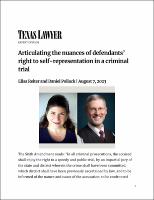Please use this identifier to cite or link to this item:
https://hdl.handle.net/20.500.12202/9167| Title: | Articulating the nuances of defendants’ right to self-representation in a criminal trial |
| Authors: | Pollack, Daniel Reiter, Elisa 0000-0001-7323-6928 |
| Keywords: | self-defense trial by jury double-jeopardy Faretta v. California (422 U.S. 806 (1975)) Wolfe v. State (Texas) |
| Issue Date: | 7-Aug-2023 |
| Publisher: | ALM |
| Citation: | Reiter, E., & Pollack, D. (2023, August 7). Articulating the nuances of defendants' right to self-representation in a criminal trial. Texas Lawyer. https://www.law.com/texaslawyer/2023/08/07/articulating-the-nuances-of-defendants-right-to-self-representation-in-criminal-trials/?slreturn=20230708100402 |
| Series/Report no.: | Texas Lawyer;August 7, 2023 |
| Abstract: | What remedy is available for being subjected to violation of the double-jeopardy rule? The appellate court considers the most serious offense, and retains the conviction for the most serious offense, i.e., the offense for which the lengthiest sentence was assessed. The Fort Worth Court of Appeals affirms Wolfe’s convictions that survive the double-jeopardy analysis. |
| Description: | Expert opinion |
| URI: | https://www.researchgate.net/publication/372959116_Articulating_the_nuances_of_defendants'_right_to_self-representation_in_a_criminal_trial https://hdl.handle.net/20.500.12202/9167 |
| ISSN: | 0267-8306 (print) |
| Appears in Collections: | Wurzweiler School of Social Work: Faculty publications |
Files in This Item:
| File | Description | Size | Format | |
|---|---|---|---|---|
| Reiter Pollack 7July2023 art Texas Lawyer Articulating the nuances.pdf | 313 kB | Adobe PDF |  View/Open |
This item is licensed under a Creative Commons License

